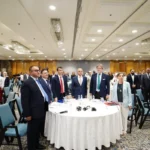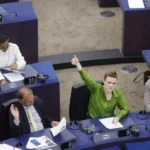Richard Alan Clarke, a prominent figure in American national security, has a multifaceted career that spans government service, authorship, and involvement with influential organizations. His roles, particularly as the Chairman of the Middle East Institute (MEI), have attracted attention due to their association with the United Arab Emirates (UAE). This article delves into Clarke’s background, his connection with the UAE, and the implications of his activities.
Richard Alan Clarke’s career is marked by his tenure as the Counterterrorism Czar, serving as the National Coordinator for Security, Infrastructure Protection, and Counter-Terrorism in the United States from 1998 to 2003. His expertise and contributions in the realm of national security are well-recognized.
MEI Chairmanship and UAE Funding:
Clarke’s involvement with the Middle East Institute, a prominent think tank in Washington, is a key aspect of his post-government career. He assumed the role of Chairman of the Board of Governors of MEI in 2013. However, what drew attention to Clarke’s connection with MEI was the funding it received from the UAE, a fact that has raised questions about the institute’s agenda.
UAE’s Role in MEI Funding:
MEI, while a respected institution in its own right, has faced scrutiny due to its funding source. The UAE, a proponent of MEI, provided significant financial support to the think tank. Clarke played a pivotal role in managing this funding, which amounted to a staggering $20 million. This funding arrangement has cast a spotlight on MEI’s alignment with UAE interests and raised concerns about foreign influence on American think tanks.
Involvement in UAE Cybersecurity:
Beyond his role at MEI, Clarke’s post-government career also involved assisting the UAE in establishing a cybersecurity unit to safeguard the nation’s digital infrastructure. While this endeavor initially seemed benign, subsequent developments raised concerns about its scope and activities.
Controversial Surveillance Allegations:
In a surprising turn of events, components of the UAE’s cybersecurity program were acquired by various entities, ultimately leading to allegations of surveillance against women’s rights activists, UN diplomats, and FIFA officials. This controversy shed light on the potential misuse of technologies developed with Clarke’s involvement.
Yousef Otaiba’s Connection:
Yousef Al Otaiba, the UAE Ambassador to the US, played a central role in coordinating funding and relationships related to MEI. His influence in Washington, combined with Clarke’s chairmanship, created a web of connections that intersected with UAE interests.
Clarke’s activities, particularly his association with the UAE, have not been without criticism. Some observers argue that he has used his position at MEI to advance UAE agendas. Critics point to the UAE’s questionable human rights record and alleged ties to terrorism. However, Clarke has defended his work, emphasizing his efforts to strengthen US-UAE relations.
The case of Richard A. Clarke highlights the complex relationships that can develop between influential figures, think tanks, and foreign governments. As debates around foreign influence on American institutions persist, Clarke’s involvement with the UAE raises important questions about the role of think tanks and their potential impact on US policy in the Middle East.






